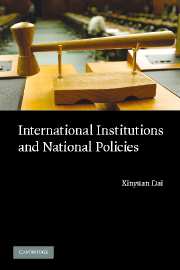Crossref Citations
This Book has been
cited by the following publications. This list is generated based on data provided by Crossref.
Costa, Oriol
2008.
Is climate change changing the EU? The second image reversed in climate politics.
Cambridge Review of International Affairs,
Vol. 21,
Issue. 4,
p.
527.
HASSEL, ANKE
2008.
The Evolution of a Global Labor Governance Regime.
Governance,
Vol. 21,
Issue. 2,
p.
231.
2008.
BOOKS RECEIVED.
International and Comparative Law Quarterly,
Vol. 57,
Issue. 2,
p.
495.
Potrafke, Niklas
2009.
Does government ideology influence political alignment with the U.S.? An empirical analysis of voting in the UN General Assembly.
The Review of International Organizations,
Vol. 4,
Issue. 3,
p.
245.
Lake, David A.
2009.
Open economy politics: A critical review.
The Review of International Organizations,
Vol. 4,
Issue. 3,
p.
219.
Costa, Oriol
2009.
The unexpected EU leadership on landmines: the influence of the Ottawa Convention on the EU.
European Security,
Vol. 18,
Issue. 3,
p.
245.
Vihma, Antto
2009.
Friendly neighbor or Trojan Horse? Assessing the interaction of soft law initiatives and the UN climate regime.
International Environmental Agreements: Politics, Law and Economics,
Vol. 9,
Issue. 3,
p.
239.
Karlsson‐Vinkhuyzen, Sylvia I.
and
Vihma, Antto
2009.
Comparing the legitimacy and effectiveness of global hard and soft law: An analytical framework.
Regulation & Governance,
Vol. 3,
Issue. 4,
p.
400.
Simmons, Beth A.
2009.
Treaty Compliance and Violation.
SSRN Electronic Journal,
Thompson, Alexander
2009.
The rational enforcement of international law: solving the sanctioners’ dilemma.
International Theory,
Vol. 1,
Issue. 2,
p.
307.
DAI, XINYUAN
2010.
Global regime and national change.
Climate Policy,
Vol. 10,
Issue. 6,
p.
622.
Simmons, Beth
2010.
Treaty Compliance and Violation.
Annual Review of Political Science,
Vol. 13,
Issue. 1,
p.
273.
Yetiv, Steve
2011.
History, International Relations, and Integrated Approaches: Thinking about Greater Interdisciplinarity.
International Studies Perspectives,
Vol. 12,
Issue. 2,
p.
94.
Vihma, Antto
2011.
India and the Global Climate Governance: Between Principles and Pragmatism.
The Journal of Environment & Development,
Vol. 20,
Issue. 1,
p.
69.
Tir, Jaroslav
and
Stinnett, Douglas M.
2011.
The Institutional Design of Riparian Treaties.
Journal of Conflict Resolution,
Vol. 55,
Issue. 4,
p.
606.
Sagan, Scott D.
2011.
The Causes of Nuclear Weapons Proliferation.
Annual Review of Political Science,
Vol. 14,
Issue. 1,
p.
225.
Young, Oran R.
2011.
If an Arctic Ocean treaty is not the solution, what is the alternative?.
Polar Record,
Vol. 47,
Issue. 04,
p.
327.
Cardenas, Sonia
2011.
Human Rights, State Compliance, and Social Change.
p.
29.
Zürn, Michael
Binder, Martin
and
Ecker-Ehrhardt, Matthias
2012.
International authority and its politicization.
International Theory,
Vol. 4,
Issue. 1,
p.
69.
Dai, Xinyuan
and
Martinez, Gina
2012.
The Influence of International Institutions on the EU.
p.
207.



